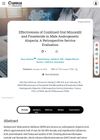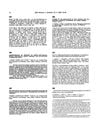 November 2024 in “Journal of Cosmetic Dermatology”
November 2024 in “Journal of Cosmetic Dermatology” Early treatment can reverse hair loss from dermal fillers.
 February 2024 in “ACS Omega”
February 2024 in “ACS Omega” The Shen Bai Hair Growing Decoction may help treat hair loss by promoting hair growth and reducing inflammation.
 May 2022 in “Pharmacognosy journal”
May 2022 in “Pharmacognosy journal” Moringa seed oil may help prevent hair loss and promote hair growth.
 March 2023 in “International Journal of Advanced Research in Science, Communication and Technology”
March 2023 in “International Journal of Advanced Research in Science, Communication and Technology” Various medicinal plants like Polygonum multiflorum, Red ginseng extract, and Zizyphus jujuba can potentially treat hair loss, offering benefits like low cost and multiple ways of working. Other effective natural substances include Pygeum africanum, Seneroa, Urtica dioica, and more.
 7 citations,
August 2021 in “Heliyon”
7 citations,
August 2021 in “Heliyon” Phyllotex™ extract was found to significantly promote hair growth and protect against hair loss.
 2 citations,
March 2021 in “Journal of Cosmetic Dermatology”
2 citations,
March 2021 in “Journal of Cosmetic Dermatology” Combining platelet-rich plasma therapy with low dose oral minoxidil improved hair growth in men with hair loss, with slightly higher satisfaction at the higher minoxidil dose.
 January 2020 in “Der Pharmacia Lettre”
January 2020 in “Der Pharmacia Lettre” Nanoparticle-based herbal remedies could be promising for treating hair loss with fewer side effects and lower cost, but more research is needed.
 16 citations,
September 2018 in “Journal of Ethnopharmacology”
16 citations,
September 2018 in “Journal of Ethnopharmacology” Plant-based remedies may treat hair loss by reducing inflammation and improving insulin resistance.
 41 citations,
July 2015 in “Current Drug Discovery Technologies”
41 citations,
July 2015 in “Current Drug Discovery Technologies” Some plants may help with hair growth and have fewer side effects than synthetic drugs, but more research is needed to confirm their effectiveness.
 19 citations,
April 2020 in “Dermatologic Therapy”
19 citations,
April 2020 in “Dermatologic Therapy” Dutasteride works better than finasteride for hair loss, with both being safe to use.
 19 citations,
May 2020 in “Journal of The American Academy of Dermatology”
19 citations,
May 2020 in “Journal of The American Academy of Dermatology” Low-dose oral minoxidil improves hair growth in male hair loss.
 1 citations,
January 2010 in “Springer eBooks”
1 citations,
January 2010 in “Springer eBooks” Certain micronutrients may improve hair and nail health, but more research is needed to confirm their benefits.
 December 2024 in “Asian Journal of Pharmaceutical and Clinical Research”
December 2024 in “Asian Journal of Pharmaceutical and Clinical Research” Combining synthetic and herbal treatments may help with hair loss, but more research is needed.
 August 2023 in “International journal of basic and clinical pharmacology”
August 2023 in “International journal of basic and clinical pharmacology” Herbal hair serum promotes natural hair growth and maintains healthy hair.
 December 2023 in “International Journal of Science and Research (IJSR)”
December 2023 in “International Journal of Science and Research (IJSR)” Herbal treatments are effective and preferred for hair loss with fewer side effects.

Combined oral minoxidil and finasteride significantly improve hair density in men with male pattern baldness.
 5 citations,
September 2017 in “Plastic and Aesthetic Research”
5 citations,
September 2017 in “Plastic and Aesthetic Research” Low dose cyclical nutrition therapy can consistently and safely improve hair growth and density without needing anti-androgens.
 1 citations,
August 2023 in “Clinical, Cosmetic and Investigational Dermatology”
1 citations,
August 2023 in “Clinical, Cosmetic and Investigational Dermatology” A condition with certain scalp changes may come before acne keloidalis nuchae and other similar hair loss disorders.
 54 citations,
May 2018 in “Journal of The European Academy of Dermatology and Venereology”
54 citations,
May 2018 in “Journal of The European Academy of Dermatology and Venereology” Low level laser therapy works best for hair loss, followed by PRP, finasteride, and minoxidil.
 8 citations,
April 2020 in “Journal of Ethnopharmacology”
8 citations,
April 2020 in “Journal of Ethnopharmacology” Herbs might help with hair loss, but more research is needed to confirm their safety and effectiveness.
 3 citations,
June 2021 in “Cosmetics”
3 citations,
June 2021 in “Cosmetics” A mix of sulforaphane, L-menthol, and dexpanthenol could help increase hair growth and reduce hair loss.
 13 citations,
January 2016 in “Journal of cosmetology & trichology”
13 citations,
January 2016 in “Journal of cosmetology & trichology” Alternative treatments show promise for hair growth beyond traditional methods.
 November 2023 in “Translational Medicine Communications”
November 2023 in “Translational Medicine Communications” Derinat may improve hair growth and quality of life in hair loss patients by reducing oxidative stress.
 5 citations,
December 1979 in “Clinical and Experimental Dermatology”
5 citations,
December 1979 in “Clinical and Experimental Dermatology” Anti-androgens are effective for female acne but less so for male-pattern hair loss, with side effects similar to birth control pills.
 1 citations,
August 2002 in “Zeitschrift für Hautkrankheiten”
1 citations,
August 2002 in “Zeitschrift für Hautkrankheiten” Male androgenetic alopecia involves hair follicle miniaturization due to DHT, with potential treatments using inhibitors and blockers.
 82 citations,
May 2016 in “Best Practice & Research in Clinical Obstetrics & Gynaecology”
82 citations,
May 2016 in “Best Practice & Research in Clinical Obstetrics & Gynaecology” The conclusion is that managing androgen excess requires long-term treatment, including hormonal contraceptives and androgen blockers, with follow-up after six months.
 11 citations,
December 2018 in “Assay and Drug Development Technologies”
11 citations,
December 2018 in “Assay and Drug Development Technologies” Natural herbal compounds might treat certain medical conditions by reducing DHT levels, but more research is needed to confirm their effectiveness and safety.
 11 citations,
May 2010 in “Journal of Medicinal Chemistry”
11 citations,
May 2010 in “Journal of Medicinal Chemistry” A new compound was created in 2010 that can control oil production when applied to the skin, and its effects are completely reversible after two weeks.
 11 citations,
March 2009 in “Bioorganic & Medicinal Chemistry Letters”
11 citations,
March 2009 in “Bioorganic & Medicinal Chemistry Letters” Chemicals called 4-(alkylthio)- and 4-(arylthio)-benzonitrile derivatives can potentially reduce oil production on skin, which could help treat conditions like acne and hair loss.
 August 1994 in “Journal of dermatological science”
August 1994 in “Journal of dermatological science” Mouse hair cells respond to male hormones by growing less, and this can be stopped by certain blockers.






























